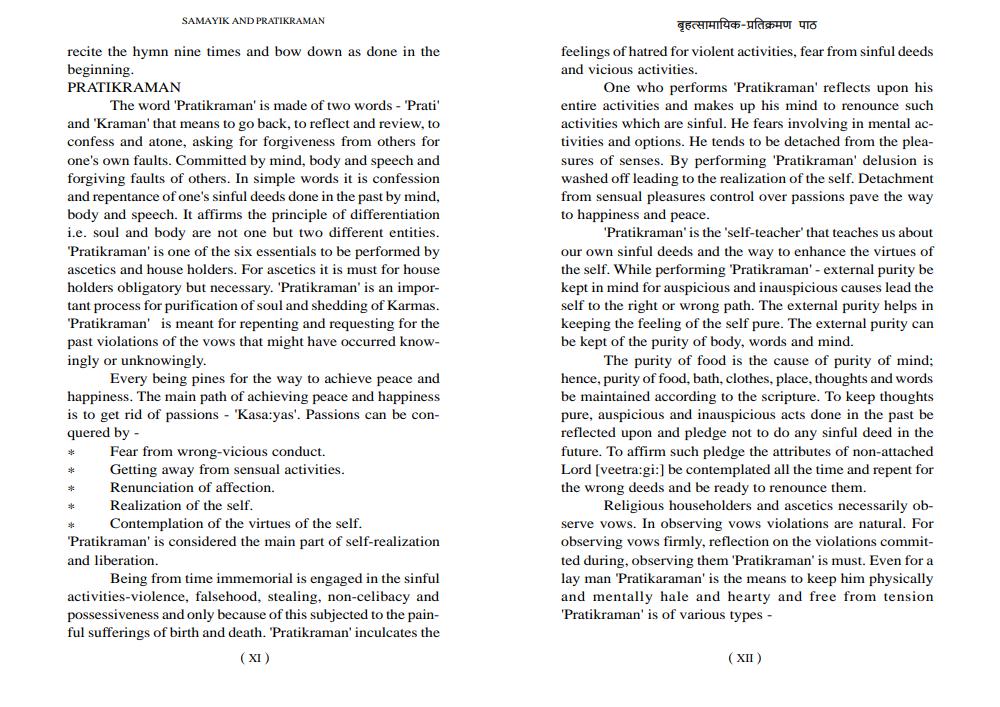Book Title: Bruhat Samayik Pratikraman Path Author(s): Subhashchand Jain, Mahendrakumar Jain Publisher: Akhil Bharatvarshiya Digambar Jain Vidvat Parishad View full book textPage 7
________________ SAMAYIK AND PRATIKRAMAN recite the hymn nine times and bow down as done in the beginning PRATIKRAMAN The word 'Pratikraman' is made of two words - 'Prati and 'Kraman' that means to go back, to reflect and review, to confess and atone, asking for forgiveness from others for one's own faults. Committed by mind, body and speech and forgiving faults of others. In simple words it is confession and repentance of one's sinful deeds done in the past by mind, body and speech. It affirms the principle of differentiation i.e. soul and body are not one but two different entities. "Pratikraman' is one of the six essentials to be performed by ascetics and house holders. For ascetics it is must for house holders obligatory but necessary. 'Pratikraman' is an important process for purification of soul and shedding of Karmas. "Pratikraman' is meant for repenting and requesting for the past violations of the vows that might have occurred knowingly or unknowingly. Every being pines for the way to achieve peace and happiness. The main path of achieving peace and happiness is to get rid of passions - 'Kasa:yas'. Passions can be conquered by Fear from wrong-vicious conduct. Getting away from sensual activities. Renunciation of affection. Realization of the self. Contemplation of the virtues of the self. "Pratikraman' is considered the main part of self-realization and liberation. Being from time immemorial is engaged in the sinful activities-violence, falsehood, stealing, non-celibacy and possessiveness and only because of this subjected to the painful sufferings of birth and death. 'Pratikraman'inculcates the (XI) बृहत्सामायिक-प्रतिक्रमण पाठ feelings of hatred for violent activities, fear from sinful deeds and vicious activities. One who performs 'Pratikraman' reflects upon his entire activities and makes up his mind to renounce such activities which are sinful. He fears involving in mental activities and options. He tends to be detached from the pleasures of senses. By performing 'Pratikraman' delusion is washed off leading to the realization of the self. Detachment from sensual pleasures control over passions pave the way to happiness and peace. "Pratikraman'is the 'self-teacher' that teaches us about our own sinful deeds and the way to enhance the virtues of the self. While performing "Pratikraman'- external purity be kept in mind for auspicious and inauspicious causes lead the self to the right or wrong path. The external purity helps in keeping the feeling of the self pure. The external purity can be kept of the purity of body, words and mind. The purity of food is the cause of purity of mind; hence, purity of food, bath, clothes, place, thoughts and words be maintained according to the scripture. To keep thoughts pure, auspicious and inauspicious acts done in the past be reflected upon and pledge not to do any sinful deed in the future. To affirm such pledge the attributes of non-attached Lord [veetra:gi:] be contemplated all the time and repent for the wrong deeds and be ready to renounce them. Religious householders and ascetics necessarily observe vows. In observing vows violations are natural. For observing vows firmly, reflection on the violations committed during, observing them 'Pratikraman' is must. Even for a lay man 'Pratikaraman' is the means to keep him physically and mentally hale and hearty and free from tension "Pratikraman' is of various types - (XII)Page Navigation
1 ... 5 6 7 8 9 10 11 12 13 14 15 16 17 18 19 20 21 22 23 24 25 26 27 28 29 30 31 32 33 34 35 36 37 38 39 40 41 42 43 44 45 46 47 48 49 50 51 52 53 54 55 56 57 58 59 60 61 62 63 64 65 66 67 68 69 70 71 72 ... 105
